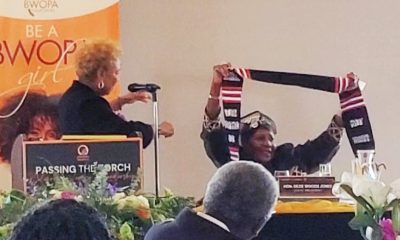City Government
City Provides Some Parking to Keep Trucks Out of Neighborhoods
The Oakland Army Base Development project has taken a significant turn this week as city staff confirmed on Tuesday a temporary and partial solution to address the need for additional truck parking.
As Oakland Maritime Support Services (OMSS) and owner Bill Aboudi completes the move to his new site on Wake Avenue, the city has committed to using 3 acres within the project area for the overflow of truck parking.
The new truck parking lot will help at least some of the hundreds of truckers who previously parked at Aboudi’s 15-acre site and keep some of the big rigs off of city streets.
Approached by Post staff, the mayor refused to comment on the impact of the Army Base project on local jobs and neighborhoods.
It is unclear whether OMSS or a private company will manage the new 3-acre lot, to be located on Burma Road at the OMSS old site. City staff says they have been working to resolve this issue with the Port of Oakland, OMSS, and CCIG, owned by the city’s Army Base developer Phil Tagami.
The Post reported last week that the demand for space and trucking services has left many independent truckers in a bind and at the mercy of long lines and higher costs for mechanics and other services.
The volume of trucks lined up at Port Scales, Inc. continues to increase as truckers wait an hour in line with the close of the 24-hour mini-mart and truck scale previously located at Aboudi’s OMSS.
“Sept. 13 was a difficult day for Bill [Aboudi] and a lot of people. I would say from there on, there’s been what I would consider a lot of cooperation between OMSS staff, city staff, port staff, and CCIG staff,” said John Monetta, project manager for the city’s Army Base project.
OMSS was hooked up to electrical power at its new site on Tuesday and received water hook ups last week thanks to the work of port staff, but Aboudi says his business, which is the home of a number of small tenant businesses, is still struggling to recover.
“One of my biggest issues right now is the unemployment of about 75 people. Mechanics can’t get back to work unless we completely move to the new site. We can’t move onto property that has no water and no sewer connections. We’re waiting for those services to be supplied,” said Aboudi.

Mayor Jean Quan has maitinued her silence on the Army Base struggle. Photo taken by Spencer Whitney.
Aboudi says he and his staff have been running between the old and new sites to keep his tenants happy.
“We were assured by the Mayors Office that we would have enough time to get those services, but it didn’t happen that way,” he said.
Aboudi and his tenants now have until Oct. 3 – 20 days after the Sept. 13 eviction – to remove all their personal property from their site on Maritime Street as the city moves forward with its Army Base development project.
“The ultimate remedy to move forward with the project is to auction the remaining personal property,” said Monetta at the city’s Community and Economic Development (CED) meeting Tuesday.
“We don’t want to do it, but at times you need to establish certain deadlines for folks, or folks just don’t move,” Monetta said.
Councilmember Lynette McElhaney, chairing the CED meeting, pushed for city staff to give tenants the opportunity to redeem their property or cover costs to have it relocated to the new OMSS site.
Activism
Oakland Post: Week of November 26 – December 2, 2025
The printed Weekly Edition of the Oakland Post: Week of November 26 – December 2, 2025

To enlarge your view of this issue, use the slider, magnifying glass icon or full page icon in the lower right corner of the browser window.
Activism
Oakland Post: Week of November 19 – 25, 2025
The printed Weekly Edition of the Oakland Post: Week of November 19 – 25, 2025

To enlarge your view of this issue, use the slider, magnifying glass icon or full page icon in the lower right corner of the browser window.
Activism
IN MEMORIAM: William ‘Bill’ Patterson, 94
Bill devoted his life to public service and education. In 1971, he became the founding director for the Peralta Community College Foundation, he also became an administrator for Oakland Parks and Recreation overseeing 23 recreation centers, the Oakland Zoo, Children’s Fairyland, Lake Merritt, and the Henry J. Kaiser Convention Center.

William “Bill” Patterson, 94, of Little Rock, Arkansas, passed away peacefully on October 21, 2025, at his home in Oakland, CA. He was born on May 19, 1931, to Marie Childress Patterson and William Benjamin Patterson in Little Rock, Arkansas. He graduated from Dunbar High School and traveled to Oakland, California, in 1948. William Patterson graduated from San Francisco State University, earning both graduate and undergraduate degrees. He married Euradell “Dell” Patterson in 1961. Bill lovingly took care of his wife, Dell, until she died in 2020.
Bill devoted his life to public service and education. In 1971, he became the founding director for the Peralta Community College Foundation, he also became an administrator for Oakland Parks and Recreation overseeing 23 recreation centers, the Oakland Zoo, Children’s Fairyland, Lake Merritt, and the Henry J. Kaiser Convention Center.
He served on the boards of Oakland’s Urban Strategies Council, the Oakland Public Ethics Commission, and the Oakland Workforce Development Board.
He was a three-term president of the Oakland branch of the NAACP.
Bill was initiated in the Gamma Alpha chapter of Kappa Alpha Psi Fraternity.
In 1997 Bill was appointed to the East Bay Utility District Board of Directors. William Patterson was the first African American Board President and served the board for 27 years.
Bill’s impact reached far beyond his various important and impactful positions.
Bill mentored politicians, athletes and young people. Among those he mentored and advised are legends Joe Morgan, Bill Russell, Frank Robinson, Curt Flood, and Lionel Wilson to name a few.
He is survived by his son, William David Patterson, and one sister, Sarah Ann Strickland, and a host of other family members and friends.
A celebration of life service will take place at Henry J. Kaiser Convention Center (Calvin Simmons Theater) on November 21, 2025, at 10 AM.
His services are being livestreamed at: https://www.facebook.com/events/1250167107131991/
In lieu of flowers, donations can be made to the Euradell and William Patterson scholarship fund TBA.

-

 Activism4 weeks ago
Activism4 weeks agoOakland Post: Week of November 12 – 18, 2025
-

 Activism3 weeks ago
Activism3 weeks agoIN MEMORIAM: William ‘Bill’ Patterson, 94
-

 Activism4 weeks ago
Activism4 weeks agoHow Charles R. Drew University Navigated More Than $20 Million in Fed Cuts – Still Prioritizing Students and Community Health
-

 Bay Area4 weeks ago
Bay Area4 weeks agoNo Justice in the Justice System
-

 #NNPA BlackPress3 weeks ago
#NNPA BlackPress3 weeks agoLewis Hamilton set to start LAST in Saturday Night’s Las Vegas Grand Prix
-

 #NNPA BlackPress3 weeks ago
#NNPA BlackPress3 weeks agoBeyoncé and Jay-Z make rare public appearance with Lewis Hamilton at Las Vegas Grand Prix
-

 Activism3 weeks ago
Activism3 weeks agoOakland Post: Week of November 19 – 25, 2025
-

 #NNPA BlackPress4 weeks ago
#NNPA BlackPress4 weeks agoThe Perfumed Hand of Hypocrisy: Trump Hosted Former Terror Suspect While America Condemns a Muslim Mayor






















































